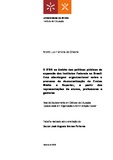O IFRN no âmbito das políticas públicas de expansão dos Institutos Federais no Brasil: uma abordagem organizacional sobre o processo de democratização do Ensino Médio e Superior, a partir das representações de alunos, professores e gestores

Visualizar/
Data
2016-07-22Autor
Oliveira, André Luiz Ferreira de
01043891412
http://lattes.cnpq.br/9817958179335988
Metadado
Mostrar registro completoResumo
The remarkable quantifiable growth the Federal Institute of Education for Science and Technology (IFRN) has passed through in recent years throughout Brazil has aroused the concern of researchers from around the country on the organizational behavior of this institution. Rio Grande do Norte presented a different expansion blueprint in comparison to other states with an IFRN representation, and therefore forms the fulcrum of this study. The IFRN is a school organization and member of the Federal Professional Education Network, presented along with other schools as uncharacteristic for possessing High School and College education under the same infrastructural and administrative “umbrella”. Thus, for the purpose of research it is necessary, in the context of national and international public policy, to understand which organizational model is the one that enabled the democratization of access to the various levels of education, including the possibility of post-graduate stricto sensu offer, from 2008 onwards. In this study, the educational systems in France, Germany, the UK and Portugal, countries with strong traditions as to technical education, are set as the benchmark to
confront the reality in Brazil and thereby to contribute to the interpretation of the current state of affairs of national education. To achieve the established objective, the study was provided to the actors of the campi of the first phase of expansion: Currais Novos, Ipanguaçu and Natal-Zona Norte, plus the Campus Natal-Central, which served as a key comparison element, since it is the oldest campus of them all. From the testimonies of 6 managers and 4 teachers harvested from an interview survey on the one hand, and 306 former students through the questionnaire survey on the other, it was possible to make the crossing of their responses and impressions, as well as extract the organizational representation that each of these agents possessed. In carrying out this analysis in a reverse order as opposed to the traditional way; that is, from the graduating students to the top of the organization, it was possible to realize the strong presence of rational bureaucratic models, political and ambiguous, the latter being given the time and the turbulent consequences caused by the expansion of apparently temporary nature. On the other hand, from the effects caused by the expansion stands out not loyalty of students of professional technical courses, when they have the opportunity to continue their studies in Colleges education at the same institution and, on the contrary, prefer to move to other institutes such as, for example, Universities. The causes that lead students to take these decisions refer to the decision-making and political reforms, internal and external, to the institution which ultimately
influences the supply and demand by IFRN courses.



